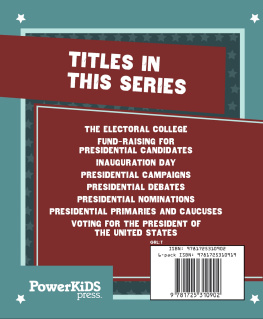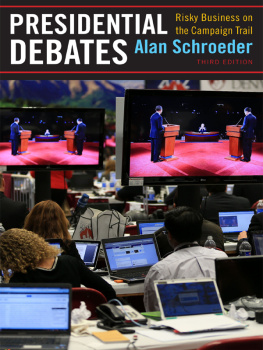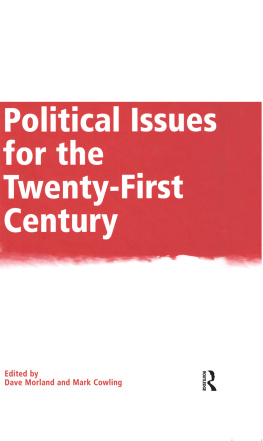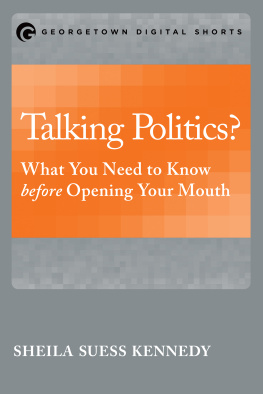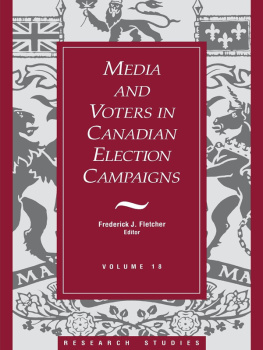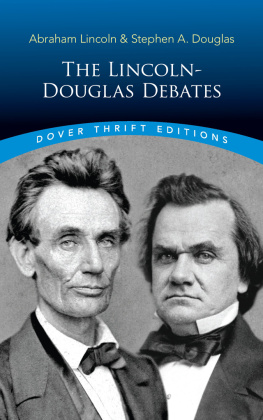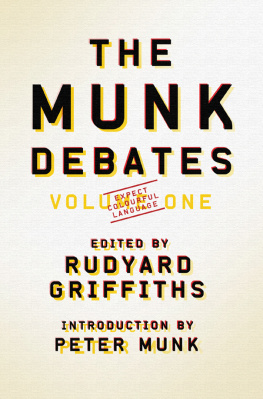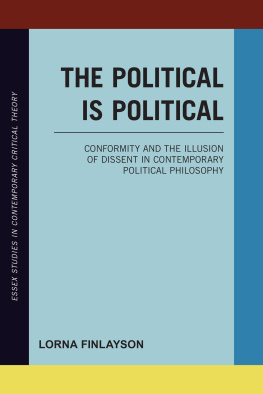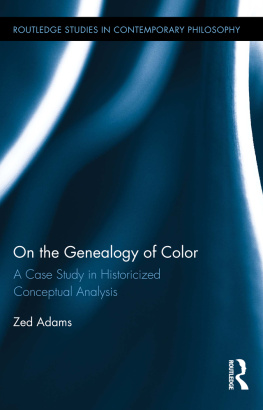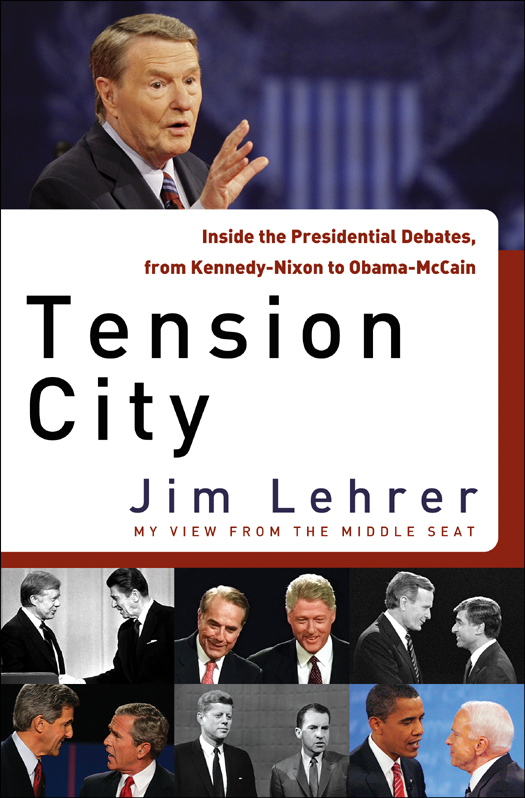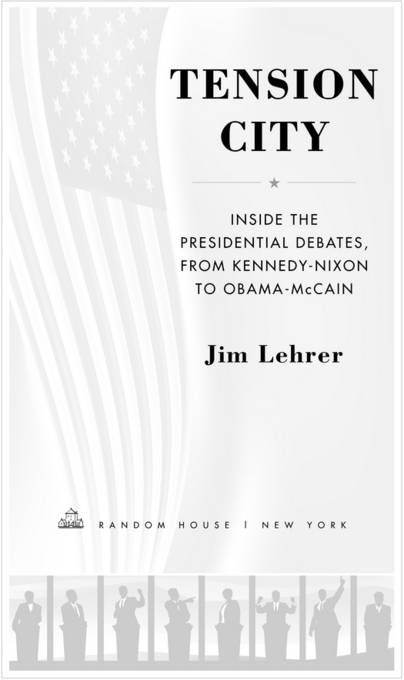Copyright 2011 by Jim Lehrer
All rights reserved.
Published in the United States by Random House, an imprint of The Random House Publishing Group, a division of Random House, Inc., New York.
R ANDOM H OUSE and colophon are registered trademarks of Random House, Inc.
LIBRARY OF CONGRESS CATALOGING-IN-PUBLICATION DATA
Lehrer, James.
Tension city: Inside the presidential debates, from Kennedy-Nixon to
Obama-McCain / Jim Lehrer.
p. cm.
eISBN: 978-0-679-60351-1
1. Campaign debatesUnited States. 2. PresidentsUnited StatesElection.
3. Television in politicsUnited States. 4. Lehrer, James. I. Title.
JK524.L44 2011 324.73dc22 2010015080
Title-page images: copyright iStockphoto.com / liangpv (top),
copyright iStockphoto.com / Nicholas Monu (bottom)
www.atrandom.com
Jacket design: Faceout Studio, Charles Brock
Front-jacket photographs: AP Photo/Alex Brandon (Jim Lehrer), AP Photo/stf (Reagan/Carter), AP Photo/Charles Krupa (Clinton/Dole), AP Photo/Lennox McLendon (Bush/Dukakis), AP Photo (Kennedy/Nixon), Reuters/Jim Bourg (Bush/Kerry and Obama/McCain)
v3.1
Those big-time things it was tension city, Jim.
former president George H. W. Bush
in an April 10, 1999, interview
Contents
CHAPTER 1
Good Evenings
G ood evening. The television and radio stations of the United States and their affiliated stations are proud to provide facilities for a discussion of issues in the current political campaign by the two major candidates for the presidency. The candidates need no introduction. The Republican candidate, Vice President Richard M. Nixon, and the Democratic candidate, Senator John F. Kennedy.
That was how the moderator, Howard K. Smith of CBS, opened the first televised presidential debate from the studios of WBBM-TV, Chicago, on September 26, 1960.
Good evening from the Ford Center for the Performing Arts at the University of Mississippi in Oxford. Im Jim Lehrer of The NewsHour on PBS, and I welcome you to the first of the 2008 presidential debates between the Republican nominee, Senator John McCain of Arizona, and the Democratic nominee, Senator Barack Obama of Illinois.
That was how I began the first McCain-Obama debate on September 26, 2008nearly fifty years later.
There have been thirty-five nationally televised presidential and vice presidential debates, counting that first in 1960 and the last four in 2008.
All the moderators have been broadcast journalists except oneChicago Sun-Times editor James Hoge in 1976. There have been several repeaters: Howard K. Smith of CBS and ABC, Edwin Newman of NBC, Barbara Walters of ABC, Bernard Shaw of CNN, Bob Schieffer of CBS, my PBS colleague Gwen Ifill, and I account for twenty-one of the thirty-five moderating assignments.
Our Good evenings have remained roughly the sameexcept for the top billing going to the geography.
Good evening from the Wait Chapel at Wake Forest University in Winston-Salem, North Carolina.
Good evening from the Bushnell Theater in Hartford, Connecticut.
Good evening from the University of Miami Convocation Center in Coral Gables, Florida.
The first of my greetings was for a 1988 debate between Vice President George H. W. Bush and Governor Michael Dukakis in Winston-Salem.
That was when I got my introduction to the terrors and triumphs of moderating presidential debates, an experience I have sometimes compared to walking down the blade of a knife.
At Winston-Salem, it actually started before the debate itself.
I was closeted behind a closely guarded conference room door with my three debate colleaguesPeter Jennings of ABC, Annie Groer of the Orlando Sentinel, and John Mashek of The Atlanta Constitutionto discuss our questions for Bush and Dukakis. This was before the coming of the single-moderator format; the standard arrangement was a moderator plus panelists.
Jennings, anchor of ABCs World News Tonight, had an act of provocation on his mind.
He urged the four of us to forget the rules that had been agreed upon between the candidates and the Commission on Presidential Debates. We should publiclyin front of the whole worldinvite Bush and Dukakis to take on each other directly with no time limits on questions, answers, or anything else.
I said we couldnt do that. We had given our word to follow the rules of the debate. Not to do so, I insisted in my most righteous tone, would be dishonorable, among other things.
Annie Groer and John Mashek agreed. Jennings quickly went along, with grace and professionalism.
Also in Winston-Salem, my wife, Kate, helped with some much needed pre-debate personal perspective that remains with me to this day.
In the hotel, as we were leaving for the debate, I came down with a bad case of nerves. I whined to Kate about how terrible the pressure was on me.
She said, quite calmly, If its bad for you, think what it must be like for those two candidatesone bad move and they lose the presidency of the United States.
True.
But I was still left with the pre-debate anxieties that have been with me in every one of the ten presidential and vice presidential debates I have moderated since. I soon learned that dealing with nerves is the key to being able to function effectively as a moderator. My guess is that there are surgeons, classroom teachers, and short-order cooks among the huge crowds of other people who know exactly what Im talking about. Possibilities of pleasure and satisfaction, horror and failure, await everyone who performs.
The incredibly high stakes are what magnify it all in presidential debates. Candidates and their attendants have only one overriding purposeto win the election to be the most powerful person in the world. But others, including most in the serious press and political science worlds, see debates as decisive opportunities to inform and educate the voters about whom to grant such power.
The critical space between those two very different purposes is the battleground on which all combat occurs.
UGLY, I DONT like em.
Thats how George H. W. Bush categorizes his debate experience.
Why not?
Well, partially I wasnt too good at em. Secondly, theres some of its contrived. Show business. You prompt to get the answers ahead of time. Now this guy, you got Bernie Shaw on the panel and heres what hes probably gonna ask you. You got Leslie Stahl over here and shes known to go for this and that, I want to be sure I remember what Leslies going to ask and get this answer. Theres a certain artificiality to it, lack of spontaneity to it. And, I dont know, I just felt uncomfortable about it.
That exchange was one of the many I have had with the candidates after their presidential and vice presidential debates. The interviews, done over a period of twenty years, began as an oral history project with the Commission on Presidential Debates. Portions were later used in Debating Our Destiny, a two-hour PBS documentary that was first broadcast in 2000.
George W. Bushs view differed from his fathers.
I think its useful for people [to] watch and see how a person they dont know stands up and answers questions and deals with the thrusts and parries of the debate. I actually also think you can learn what the person really believes. I think they are very useful.


